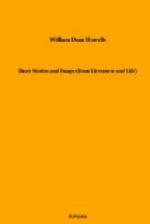There is a science observed in the arrangement of the various effects; against the rear wall and packed along the floor, and then in front of and on top of these, is built a superstructure of the things that may be first wanted, in case of removal, or oftenest wanted in some exigency of the homeless life of the owners, pending removal. The lightest and slightest articles float loosely about the door, or are interwoven in a kind of fabric just within, and curtaining the ponderous mass behind. The effect is not so artistic as the mortuary mosaics which the Roman Capuchins design with the bones of their dead brethren in the crypt of their church, but the warehousemen no doubt have their just pride in it, and feel an artistic pang in its provisional or final disturbance.
It had better never be disturbed, for it is disturbed only in some futile dream of returning to the past; and we never can return to the past on the old terms. It is well in all things to accept life implicitly, and when an end has come to treat it as the end, and not vainly mock it as a suspense of function. When the poor break up their homes, with no immediate hope of founding others, they must sell their belongings because they cannot afford to pay storage on them. The rich or richer store their household effects, and cheat themselves with the illusion that they are going some time to rehabilitate with them just such a home as they have dismantled. But the illusion probably deceives nobody so little as those who cherish the vain hope. As long as they cherish it, however—and they must cherish it till their furniture or themselves fall to dust—they cannot begin life anew, as the poor do who have kept nothing of the sort to link them to the past. This is one of the disabilities of the prosperous, who will probably not be relieved of it till some means of storing the owner as well as the’ furniture is invented. In the immense range of modern ingenuity, this is perhaps not impossible. Why not, while we are still in life, some sweet oblivious antidote which shall drug us against memory, and after time shall elapse for the reconstruction of a new home in place of the old, shall repossess us of ourselves as unchanged as the things with which we shall again array it? Here is a pretty idea for some dreamer




